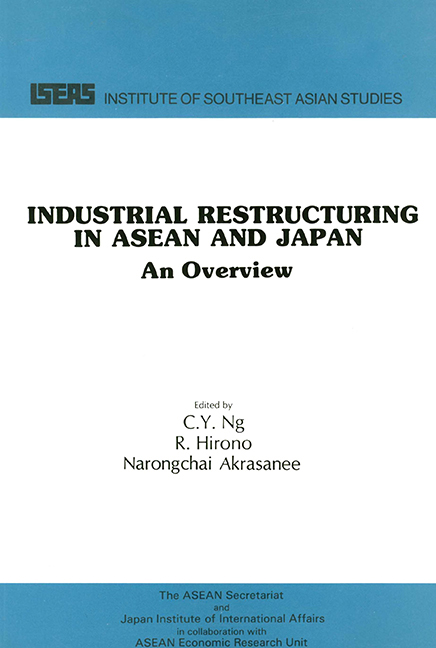Book contents
- Frontmatter
- Contents
- List of Tables
- Foreword
- Preface
- PART ONE ASEAN OVERVIEW
- PART TWO JAPAN OVERVIEW
- 1 JAPAN'S CHANGING INDUSTRIAL STRUCTURE: GROWTH AND DECLINING INDUSTRIES
- 2 CHANGING COMPARATIVE ADVANTAGES
- 3 CORPORATE RESPONSES TO INDUSTRIAL RESTRUCTURING AT HOME AND ABROAD
- 4 INDUSTRIAL RESTRUCTURING POLICY: DOMESTIC DIMENSIONS
- 5 RESTRUCTURING POLICY: INTERNATIONAL DIMENSIONS
- 6 CONCLUSIONS AND RECOMMENDATIONS
- THE EDITORS
3 - CORPORATE RESPONSES TO INDUSTRIAL RESTRUCTURING AT HOME AND ABROAD
from PART TWO - JAPAN OVERVIEW
Published online by Cambridge University Press: 21 October 2015
- Frontmatter
- Contents
- List of Tables
- Foreword
- Preface
- PART ONE ASEAN OVERVIEW
- PART TWO JAPAN OVERVIEW
- 1 JAPAN'S CHANGING INDUSTRIAL STRUCTURE: GROWTH AND DECLINING INDUSTRIES
- 2 CHANGING COMPARATIVE ADVANTAGES
- 3 CORPORATE RESPONSES TO INDUSTRIAL RESTRUCTURING AT HOME AND ABROAD
- 4 INDUSTRIAL RESTRUCTURING POLICY: DOMESTIC DIMENSIONS
- 5 RESTRUCTURING POLICY: INTERNATIONAL DIMENSIONS
- 6 CONCLUSIONS AND RECOMMENDATIONS
- THE EDITORS
Summary
Corporate Responses to Industrial Restructuring at Home and Abroad
All business corporations, in order to survive and expand in competitive markets, have to adjust their strategies and policies constantly to changes, both internal and external to themselves. Among the major internal factors changing perceptibly in recent years in Japanese corporations are the composition, mentality, attitude, and work ethics of the work-force; labour-management relations; and the composition and business concerns/priorities of major shareholders. Concrete examples of these are found in the ageing and an increasing female participation, particularly married women, in the labour force; a weakening in the bargaining power; and an increasingly defensive posture of labour unions vis-à-vis corporate management. There has also been a growing dominance of institutional and corporate ownership of equity shares that has had a significant impact on the priorities of top management in running corporations.
Among the major external factors that have confronted Japanese business corporations with conspicuous changes in recent years are the level, diversity, and cost of new technologies available; the level of per capita income and the patterns of income distribution; the consumer preferences and spending patterns; the intensity of factor and product market competition at home and abroad; the range and direction of foreign exchange rate fluctuations; and government economic policies affecting the domestic and overseas markets.
Since nearly all the internal changes can be managed within the guidelines of corporate policies on personnel management, industrial relations, and financing, it is those changes due to major external factors to which business corporations would have to respond most effectively, in order to survive and expand in competitive markets. Particularly relevant among such external factors arc product market competition and governmental competition policies, since these determine the rates of economic growth, technological innovation, and productivity improvement as well as income distribution, which in turn affect most significantly the process of industrial restructuring.
- Type
- Chapter
- Information
- Industrial Restructuring in ASEAN and JapanAn Overview, pp. 77 - 90Publisher: ISEAS–Yusof Ishak InstitutePrint publication year: 1987

